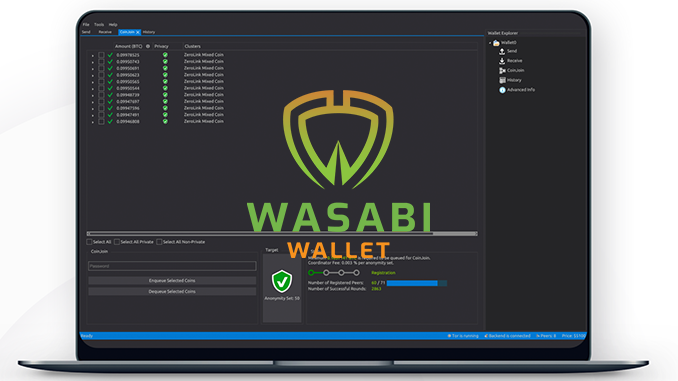
The EU police authority Europol is dealing with the Wasabi Wallet in an internal report. With this, Bitcoin can not only be stored, but also mixed very conveniently and thus made anonymous. Europol is naturally sceptical about the Wasabi Wallet.
Privacy in money matters is first and foremost a natural desire: Many citizens actively seek to hide their possessions and private money flows from the curiosity of others. Cash or numbered accounts abroad are two of the methods that are not only familiar from films. But in the digital present, it is also crypto-currencies such as Bitcoin (BTC) that attract interest with the promise of anonymity, whether from innocent citizens or criminals. An internal handbook from Europol has now examined the Wasabi Wallet for Bitcoin, which supports privacy with several features. Europol concludes that the Wasabi Wallet makes Bitcoin-related investigations considerably more difficult, if not impossible.
Background on the Bitcoin Wallet Wasabi
According to Europol, the Wasabi Wallet has been on the market since autumn 2018 and more than 110,000 Bitcoin are now stored on it. Their current converted value of around 1 billion US dollars is less than 1 percent of BTC’s market capitalisation. But Europol estimates, based on data from Chainalysis, that millions of dollars’ worth of Bitcoin flowed out of the darknet and presumably illegal business into Wasabi Wallets in the first weeks of March alone. Europol also explains why the Wasabi Wallet is so attractive:
- The code of the Wasabi Wallet is open source and the installation of a back door is largely ruled out.
- The Wasabi Wallet allows BTCs to be stored locally and therefore does not fall under the rules for the prevention of money laundering. Access by the developers of the Wasabi Wallet to accounts and BTC addresses is also impossible, according to Europol.
- Integrated into the Wasabi Wallet is convenient use of Bitcoin Mixing, in this case CoinJoin. This allows incoming BTCs to be mixed with other users’ Bitcoin and then paid out again. While incoming Bitcoin in the Wasabi Wallet can often be assigned to known addresses, this track is lost when using the Bitcoin Mixer.
- In addition, the Wasabi Wallet uses the TOR network as standard. This network aims to enable anonymous surfing by concealing IP addresses and often serves as a basis for illegal operations on the Internet.
With this overall package, the Wasabi Wallet provides “probably the most convenient and secure way to mix Bitcoin”, Europol judges, and further illustrates in case studies how investigators are biting their teeth out of the Wasabi Wallet. As long as users of the Wasabi Wallet do not make any mistakes, it is usually impossible to prove where they received BTC from and what they do with it, Europol says.
Conclusion: Europol is concerned about the Wasabi Wallet
Anyone who wishes can also read Europol’s report as a kind of advertisement for the Wasabi Wallet. Neither possession of Bitcoin nor the use of the Wasabi Wallet is prohibited. It is obvious that the prosecutors are unhappy about the possibilities of maintaining anonymity in the decentralised ecosystem of BTC. But anyone who trades in Bitcoin as an investor also knows that anonymity usually comes to an end when crypto exchanges come into play, which in the EU are required to verify the identity of their customers.
Best place to buy Bitcoin:

Leave a Reply